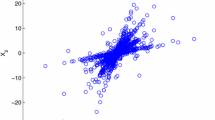Abstract
We deal with blind signal extraction in the framework of a convolutive mixture of independent sources. Considering so-called reference signals, we generalize former identifiability conditions. Based on this result, we propose to incorporate some a priori information in the references. We show the validity of reference based contrast functions in two semi-blind situations. The results are confirmed by computer simulations.
Preview
Unable to display preview. Download preview PDF.
Similar content being viewed by others
References
Castella, M., Rhioui, S., Moreau, E., Pesquet, J.C.: Quadratic higher-order criteria for iterative blind separation of a MIMO convolutive mixture of sources. IEEE Trans. Signal Processing 55(1), 218–232 (2007)
Kawamoto, M., Kohno, K., Inouye, Y.: Eigenvector algorithms incorporated with reference systems for solving blind deconvolution of MIMO-IIR linear systems. IEEE Signal Processing Letters 14(12), 996–999 (2007)
Hua, Y., Tugnait, J.K.: Blind identifiability of FIR-MIMO systems with colored input using second order statistics. IEEE Signal Processing Letters 7(12), 348–350 (2000)
Simon, C., Loubaton, P., Jutten, C.: Separation of a class of convolutive mixtures: a contrast function approach. Signal Processing (81), 883–887 (2001)
Tugnait, J.K.: Identification and deconvolution of multichannel linear non-gaussian processes using higher order statistics and inverse filter criteria. IEEE Trans. Signal Processing 45(3), 658–672 (1997)
Author information
Authors and Affiliations
Editor information
Editors and Affiliations
Rights and permissions
Copyright information
© 2009 Springer-Verlag Berlin Heidelberg
About this paper
Cite this paper
Castella, M., Moreau, E. (2009). Reference Based Contrast Functions in a Semi-blind Context. In: Adali, T., Jutten, C., Romano, J.M.T., Barros, A.K. (eds) Independent Component Analysis and Signal Separation. ICA 2009. Lecture Notes in Computer Science, vol 5441. Springer, Berlin, Heidelberg. https://doi.org/10.1007/978-3-642-00599-2_2
Download citation
DOI: https://doi.org/10.1007/978-3-642-00599-2_2
Publisher Name: Springer, Berlin, Heidelberg
Print ISBN: 978-3-642-00598-5
Online ISBN: 978-3-642-00599-2
eBook Packages: Computer ScienceComputer Science (R0)




